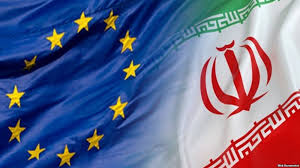
Amidst persistent threats of U.S, sanctions on Iran, there are frantic efforts in the European Union to safeguard its trade with Tehran.
Strict international sanctions against Iran were lifted in 2015 after the Western powers reache3d an agreement with the country to limit its nuclear program. Now with the U.S. pulling out of the deal, there is fear of fresh sanctions on Tehran. The denouncement of the deal was announced by U.S. president Donald Trump on 8 May and the country stepped out of the deal.
There are thousands of jobs in Europe at stake with companies that had rushed to conduct business worth billions of dollars with Iran after the implementation of the deal in 2016.
And most of the firms are fearful that they would loose out on their business with the U.S., if they have continued ties with Iran after the November deadline.
An EU “blocking statue” enacted in 1996 and designed to counter the sanctions by the U.S. on communist ruled Cuba is now being talked about. And according to EU officials, to find a way for European firms doing business with Iran and bypass the possible US restrictions on companies entering into business relationships with Tehran. that statue is being revamped.
However, the legal power of the statue is under question. There is preference among large European companies like Shell that have large U.S. operations, to seek waivers from the U.S. on a case-by-case basis.
Hefty fines have been imposed by US authorities on banks that have earlier processed Iranian transactions and that list includes banks like the UK-based Standard Chartered, HSBC and Lloyds.
Intentions of sticking firmly with the Iran deal and undertaking expansion of business ties with Iran have been expressed by France, Germany and the UK, if Iran too sticks to its part of the commitment of the deal.
EU was the biggest trade partner of Iran before Western sanctions were imposed on Tehran in 2012. Following the sanctions, there had obviously been a slump in trade which again picked up after the Iran deal.
Exports of Iran to the Eu was worth €10.1bn in 2017 while the reverse trade from the EE was €10.8bn. that was almost double the figure from the previous year.
Mots of the imports from Iran to the EU were related to energy – oil and other forms of fuel.
Machinery, transport equipment and chemicals were the major export items from the EU to Iran.
However, only about 0.6 per cent of the total global trade of the EU is accounted for by its trade with Iran. According to the European Commission, the United Arab Emirates and China are the two largest trade partners of Iran, with 23.6 per cent and 22.3 per cent of Iranian trade respectively. Trading with EU makes up only 6 per cent of its total trade.
(Source:www.bbc.com)
Strict international sanctions against Iran were lifted in 2015 after the Western powers reache3d an agreement with the country to limit its nuclear program. Now with the U.S. pulling out of the deal, there is fear of fresh sanctions on Tehran. The denouncement of the deal was announced by U.S. president Donald Trump on 8 May and the country stepped out of the deal.
There are thousands of jobs in Europe at stake with companies that had rushed to conduct business worth billions of dollars with Iran after the implementation of the deal in 2016.
And most of the firms are fearful that they would loose out on their business with the U.S., if they have continued ties with Iran after the November deadline.
An EU “blocking statue” enacted in 1996 and designed to counter the sanctions by the U.S. on communist ruled Cuba is now being talked about. And according to EU officials, to find a way for European firms doing business with Iran and bypass the possible US restrictions on companies entering into business relationships with Tehran. that statue is being revamped.
However, the legal power of the statue is under question. There is preference among large European companies like Shell that have large U.S. operations, to seek waivers from the U.S. on a case-by-case basis.
Hefty fines have been imposed by US authorities on banks that have earlier processed Iranian transactions and that list includes banks like the UK-based Standard Chartered, HSBC and Lloyds.
Intentions of sticking firmly with the Iran deal and undertaking expansion of business ties with Iran have been expressed by France, Germany and the UK, if Iran too sticks to its part of the commitment of the deal.
EU was the biggest trade partner of Iran before Western sanctions were imposed on Tehran in 2012. Following the sanctions, there had obviously been a slump in trade which again picked up after the Iran deal.
Exports of Iran to the Eu was worth €10.1bn in 2017 while the reverse trade from the EE was €10.8bn. that was almost double the figure from the previous year.
Mots of the imports from Iran to the EU were related to energy – oil and other forms of fuel.
Machinery, transport equipment and chemicals were the major export items from the EU to Iran.
However, only about 0.6 per cent of the total global trade of the EU is accounted for by its trade with Iran. According to the European Commission, the United Arab Emirates and China are the two largest trade partners of Iran, with 23.6 per cent and 22.3 per cent of Iranian trade respectively. Trading with EU makes up only 6 per cent of its total trade.
(Source:www.bbc.com)





